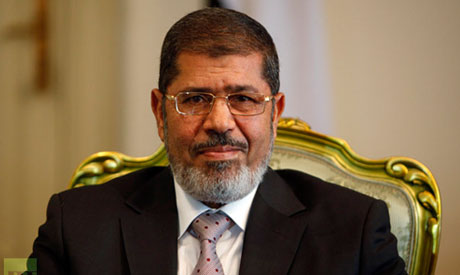
In his speech before the newly-reconstituted Upper House of parliament (Shura Council), President Morsi passes on legislative authority to the 270—member body assembly as stipulated by the new constitution.
"This esteemed council will, for the first time, effectively assume its legislative role," said Morsi, who completed last week the quorum of the council by appointing 90 members.
The constitution was approved by 64 per cent of 17 million voters out of 52 million registeered voters in a two-phase referendum that took place on 15 and 22 December.
Morsi had temporarily assumed the legislative authority upon assuming the presidency on 30 June since the High Constitution Court had dissolved the main legislative body in the country, the People’s Assembly, in mid-June.
"The new constitution ends a transitional period that has lasted too long. As we celebrate our constitution, it is now the time to build a professional state, founded on accountability," the president said.
Morsi added that building an accountability-based state "cannot succeed without empowering the civil society."
The president has also called on all political parties to engage in a national dialogue he said will sponsor before the looming parliamentary elections, which were stipulated to take place within 60 days after the ratification of the constitution.
Some opposition figures refused appointment-to-Shura Council offers by the president. The National Salvation Front, the main opposition umbrella, has announced its rejection of the constitution, which gave the Shura Council its legislative authorities, calling it “illegitimate” and “unrepresentative” because it was written and approved by the Islamist-dominated constituent assembly.
Morsi reiterated support of the Syrian uprising as well as the Palestinian cause. He also reaffirmed Egypt's commitment to all international agreements.
The president also spoke of a larger Egyptian role in regional politics.
"We have extended diplomatic efforts towards the East. The security of the Gulf region is crucial to us. We are also building strategic ties with the Nile Basin countries."
'Egypt will never go bankrupt'
As fears mount of a sharp economic downturn, the president said he has set out a clear economic agenda.
"The government's top priority is to fight poverty, unemployment, price hikes and implement a framework of social justice."
The Egyptian pound has recently lost considerable ground to the dollar, and a $4.8 billion IMF loan was postponed after weeks of political turmoil.
"We must as a nation address the economic challenges that are facing our economy, we must all work hard to restart the economy that has huge potentials of growth", explained Morsi.
Recent political conflict in the country over a controversial constitutional draft, which turned violent in some instances, compelled the ratings agency Standard and Poor's to downgrade Egypt's long-term credit rating to "B-.", despite the adoption of the new constitutional charter.
"Unfortunately our credit-rating has been downgraded due to the political faceoff the country was witnessing, let it then be a lesson to us all that political disputes should be resolved through democratic means, and that political forces should never rely on violence to reach their political goals to avoid such negative consequences," Morsi asserted.
With conflicting reports in the media last week around a potential resignation by the head of the Central Bank, rumours have circulated in business circles that Egypt could soon be facing bankruptcy as its capacity to make payments on its foreign debt diminishes.
"Those who claim that Egypt is on the brink of bankruptcy are (politically) bankrupt and unaware of the consequences their allegations could have on the country's stability, Egypt will never go bankrupt", Morsi attempted to calm investors.
President Morsi said that Egypt's economy was starting to recover and that recent indicator, including the growth rate, inflation rate, unemployment, reserves and levels of foreign debt point to “a prosperous future.”
"GDP growth rate in the first quarter of fiscal year 2012 reached 2.6 per cent; Egypt's public debt amounts to about 87 per cent of GDP, which is a rate lower than most European countries today; the number of tourists doubled in the first quarter in 2012 compared to the same period last year; all those are indicators that Egypt will be able to overcome the economic obstacles it is facing.”
Morsi announced that the government would set up a new state-body, the council on economic development, with main goals of: restarting Egypt's economy, reaching higher growth rates, and curbing public debt.
No comments:
Post a Comment